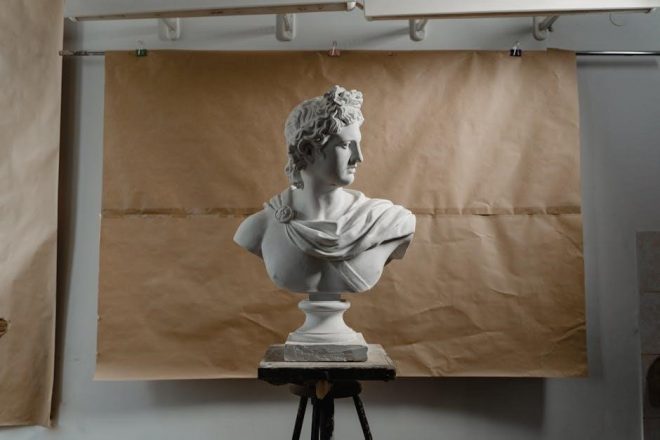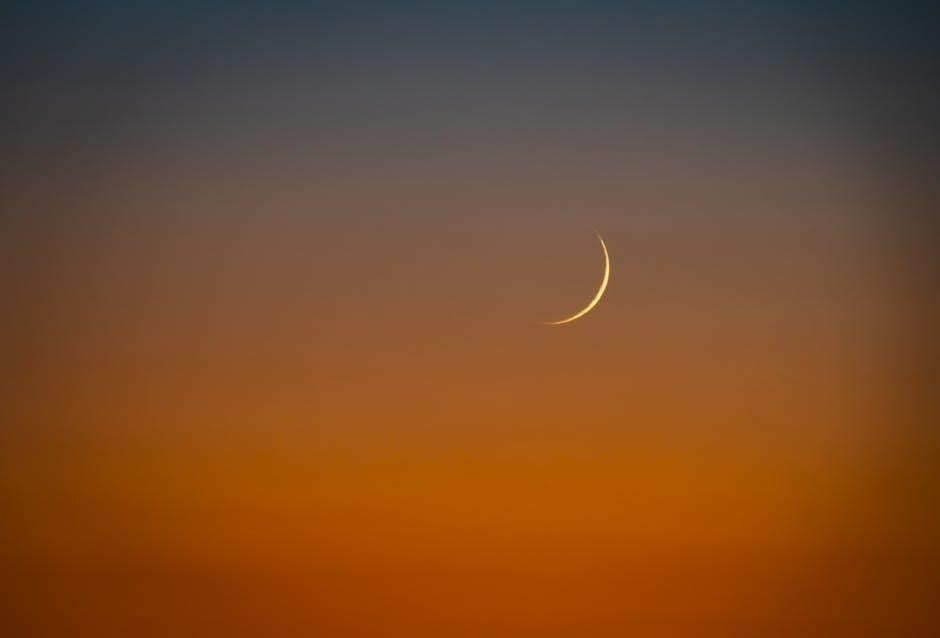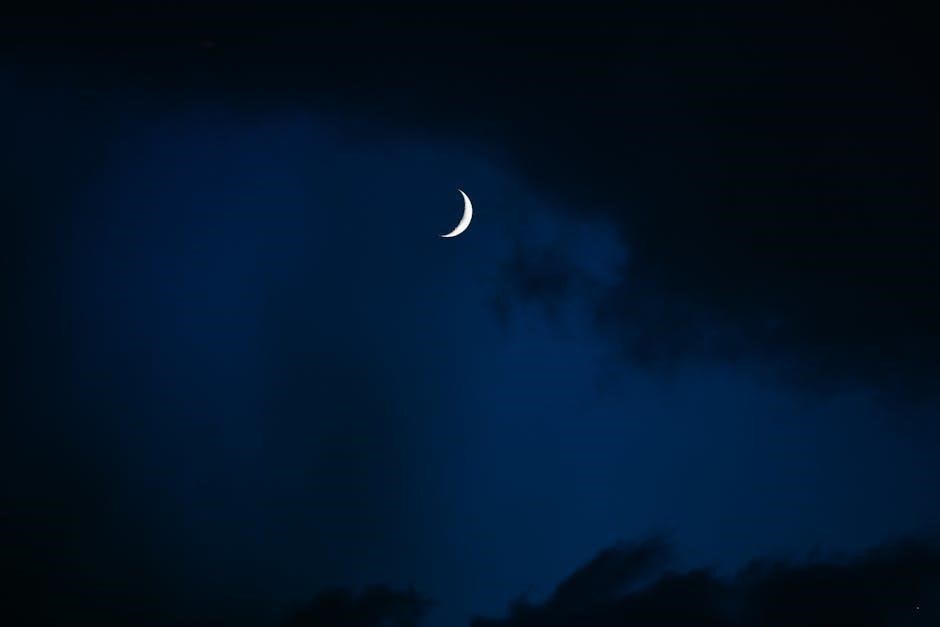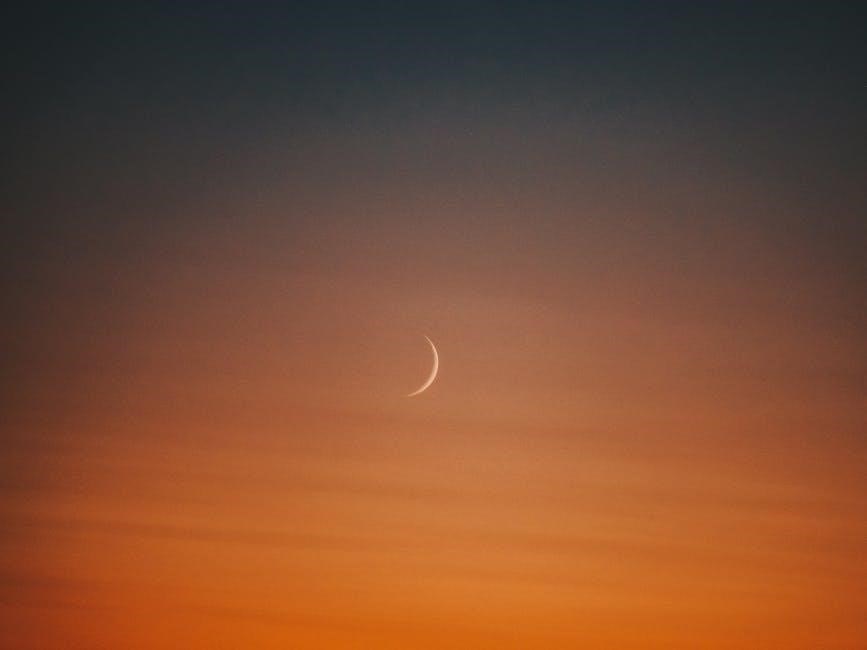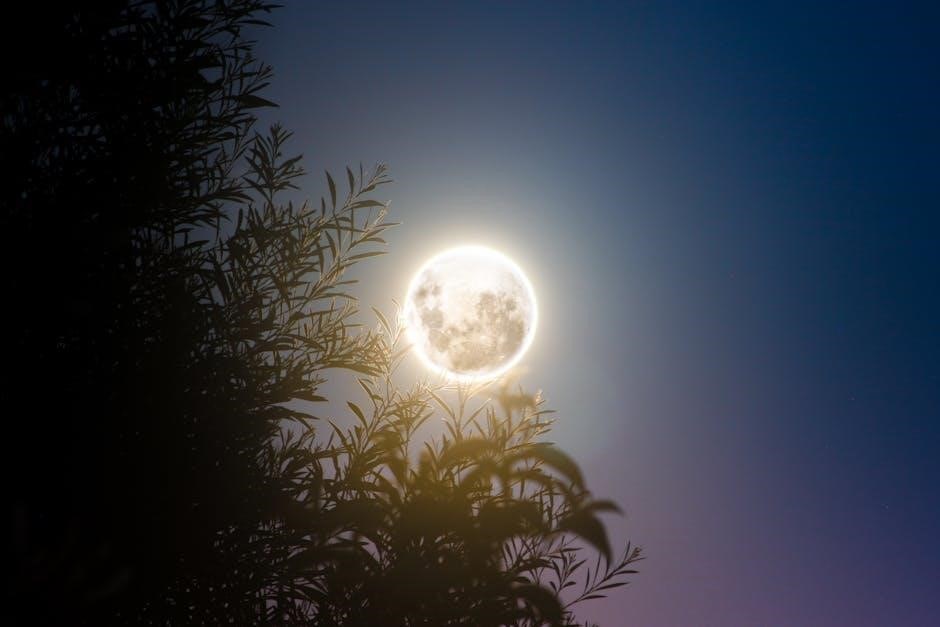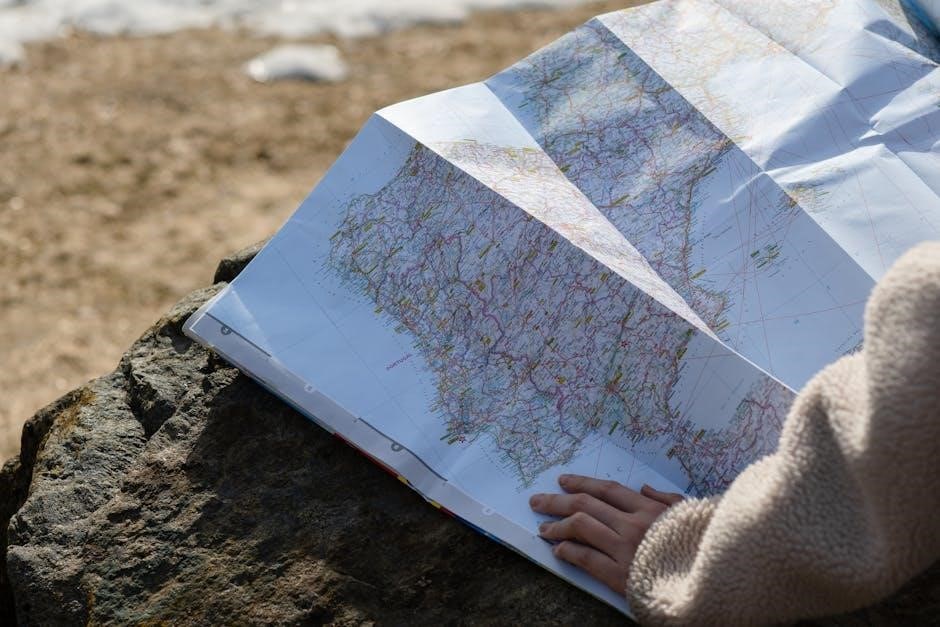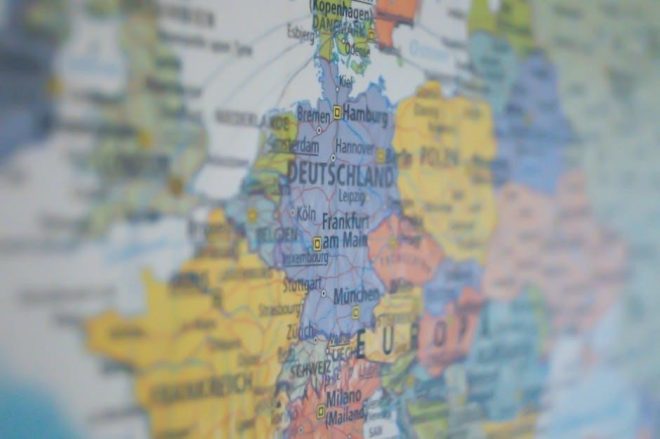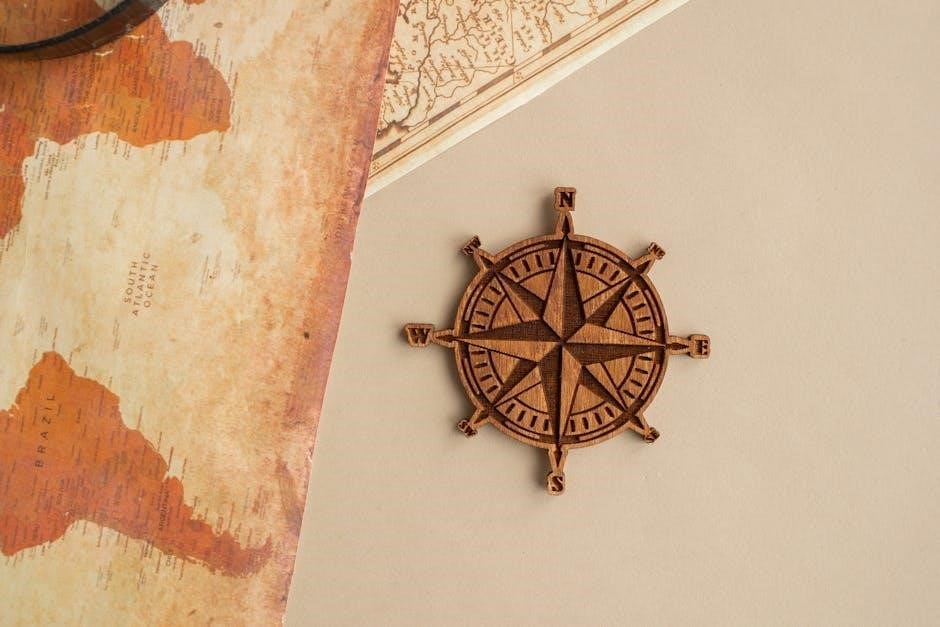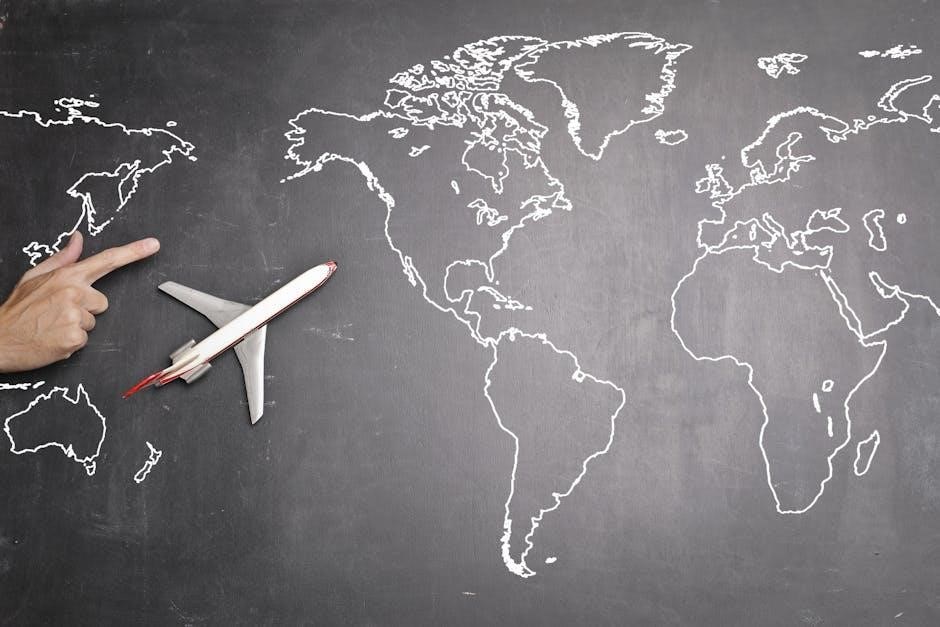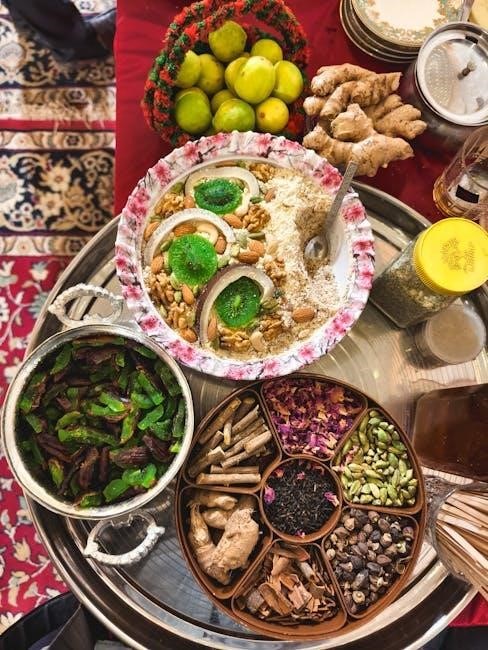The Honeywell TH4210U2002 is a T4 Pro Programmable Thermostat designed for optimal performance and energy efficiency. It features programmable scheduling‚ simple operation‚ and advanced system control options‚ ensuring precise temperature management. This manual guides installation‚ configuration‚ and troubleshooting for seamless functionality.

1.1 Overview of the Thermostat
The Honeywell TH4210U2002 T4 Pro Programmable Thermostat is a versatile and user-friendly device designed to regulate heating and cooling systems efficiently. It offers programmable scheduling options‚ including 7-day‚ 5-2‚ and 5-1-1 configurations‚ allowing users to customize temperature settings based on their daily routines. The thermostat supports single-stage heating and up to two-stage backup heat‚ ensuring compatibility with various HVAC systems. Its sleek design includes a decorative cover plate for a polished appearance. The device operates on batteries‚ eliminating the need for a common wire (C-wire) in most installations. With features like automatic or manual system changeover and fan control options‚ the TH4210U2002 provides precise temperature management and energy efficiency. Its intuitive interface and robust functionality make it an ideal choice for homeowners seeking reliable climate control.
1.2 Key Features and Benefits
The Honeywell TH4210U2002 T4 Pro Programmable Thermostat boasts an array of features designed to enhance comfort and energy efficiency. It offers programmable scheduling options‚ including 7-day‚ 5-2‚ and 5-1-1 configurations‚ allowing users to tailor temperature settings to their lifestyle. The thermostat supports single-stage heating and up to two-stage backup heat‚ ensuring compatibility with various HVAC systems. Its automatic or manual system changeover feature provides flexibility in managing heating and cooling transitions. Additionally‚ the device includes fan control options‚ enabling users to regulate airflow independently of temperature settings. The optional decorative cover plate adds a sleek‚ polished appearance to any room. With easy reset functionality and a user-friendly interface‚ this thermostat is both convenient and efficient. Its battery-powered operation eliminates the need for a common wire in most installations‚ simplifying setup and reducing wiring complexity.
1.3 Importance of Proper Installation

Proper installation of the Honeywell TH4210U2002 T4 Pro Programmable Thermostat is crucial for ensuring optimal performance‚ energy efficiency‚ and safety. Incorrect wiring or setup can lead to system malfunctions‚ increased energy consumption‚ or even safety hazards. Following the installation manual carefully guarantees that the thermostat operates as intended‚ providing precise temperature control and minimizing energy waste. Key steps include correctly connecting wires to their respective terminals‚ ensuring compatibility with the HVAC system‚ and configuring the thermostat according to the user’s needs. Proper installation also prevents potential issues like short circuits or improper system operation. By adhering to the guidelines‚ users can enjoy reliable performance‚ reduced energy bills‚ and enhanced comfort. Additionally‚ correct setup ensures that advanced features‚ such as programmable scheduling and system changeover‚ function seamlessly. Always refer to the manual for specific instructions tailored to the Honeywell TH4210U2002 model.

Installation Process
The Honeywell TH4210U2002 installation involves step-by-step guidance for mounting‚ wiring‚ and setup; Ensure compatibility with your HVAC system and follow the manual for a smooth‚ error-free process.
2.1 Preparing for Installation
Before installing the Honeywell TH4210U2002‚ ensure you have all necessary tools and materials. Turn off the power to your HVAC system at the circuit breaker. Verify system compatibility with the thermostat‚ as it supports single-stage heating with up to one backup heat stage. Unpack the thermostat‚ mounting system‚ and accessories from the package. Familiarize yourself with the wiring diagram and installation manual. Check if a C-wire (common wire) is required for your setup‚ as it may be needed for proper operation. If your system lacks a C-wire‚ consider using the included adapter. Plan the mounting location‚ ensuring it’s away from direct sunlight and drafts. Charge the batteries if they are not pre-installed. Finally‚ review the manual to understand the step-by-step process and safety precautions to ensure a smooth installation.
2.2 Mounting the Thermostat
Mounting the Honeywell TH4210U2002 thermostat begins with preparing the wall. Remove any existing thermostat and take note of the wiring. Use the provided UWP mounting plate‚ screws‚ and anchors to secure the base to the wall. Ensure the plate is level and aligned properly for accurate temperature sensing. Drill pilot holes if necessary and insert the anchors before screwing the plate into place. Once the mounting plate is secure‚ attach the thermostat to it by aligning the tabs and gently snapping it into position. Make sure the thermostat is flush against the wall and evenly aligned. If using the decorative cover plate‚ install it after mounting the thermostat. Double-check that all components are firmly attached and the display is facing the correct direction for easy access. Proper mounting ensures reliable performance and accurate temperature control.

2.3 Wiring Connections and Setup
Wiring connections are a critical step in installing the Honeywell TH4210U2002 thermostat. Begin by turning off the power to your HVAC system at the circuit breaker. Locate the wires connected to your old thermostat and label them for identification. The blue wire typically serves as the common (C) wire and must be connected to the C terminal on the thermostat. Ensure all wires are securely connected to their corresponding terminals on the TH4210U2002‚ following the wiring diagram provided in the manual. If your system requires a specific configuration‚ such as heat pump or dual-fuel setups‚ refer to the advanced wiring options. Once all connections are made‚ turn the power back on and test the thermostat by running through a heating or cooling cycle to confirm proper operation. Proper wiring ensures reliable performance and accurate temperature control.
Configuration and Setup
The Honeywell TH4210U2002 requires initial configuration to ensure proper operation. Follow the manual to set programmable schedules‚ adjust system settings‚ and enable advanced features for optimal performance and energy efficiency.
3.1 Initial Configuration Steps
After installation‚ the Honeywell TH4210U2002 requires initial configuration to function correctly. Begin by powering on the thermostat and following the on-screen prompts to set the date‚ time‚ and system type. Navigate through the menu to configure basic settings such as temperature range‚ differential‚ and fan operation. Ensure the system type (heat‚ cool‚ or heat pump) matches your HVAC setup. Select the appropriate programmable scheduling option (7-day‚ 5-2‚ or 5-1-1) based on your lifestyle. Verify that all wiring connections are correct and the thermostat is properly paired with your HVAC system. These initial steps ensure the thermostat operates efficiently and aligns with your home’s specific needs. Refer to the manual for detailed guidance on each configuration option to avoid errors and optimize performance.
3.2 Setting Up Programmable Schedules
Setting up programmable schedules on the Honeywell TH4210U2002 allows you to customize temperature settings based on your daily routine. The thermostat offers flexible scheduling options‚ including 7-day‚ 5-2‚ and 5-1-1 configurations. To set up a schedule‚ navigate to the “Schedule” menu and select the desired option. For each day or period‚ set the desired temperature for heating and cooling. You can program up to four temperature periods per day‚ ensuring energy efficiency and comfort. Use the “+” and “-” buttons to adjust temperatures‚ and press “Done” to save. The thermostat also allows overrides for temporary adjustments without disrupting the programmed schedule. Regularly review and adjust your schedule to match lifestyle changes. This feature ensures your home remains comfortable while optimizing energy usage. Refer to the manual for detailed step-by-step guidance on programming and customizing your schedule effectively.
3.3 Adjusting System Operation Settings
Adjusting system operation settings on the Honeywell TH4210U2002 allows you to fine-tune your heating and cooling system for optimal performance. Key settings include heat stage control‚ system changeover‚ and fan operation. The thermostat supports up to 1 heat stage and 1 backup heat stage‚ ensuring compatibility with various HVAC systems. System changeover can be set to automatic or manual‚ depending on your preference. Fan control options enable you to choose between continuous or periodic operation‚ improving air circulation. Additionally‚ you can adjust temperature limits to prevent extreme settings‚ saving energy and protecting your system. Use the menu navigation to access these settings and customize them according to your needs. Proper adjustment ensures efficient system operation‚ enhanced comfort‚ and energy savings. Refer to the manual for detailed instructions on configuring these settings for your specific setup.

Advanced Features
The Honeywell TH4210U2002 offers programmable scheduling‚ automatic/manual system changeover‚ and fan control options. It supports 1 heat stage and 1 backup heat stage‚ ensuring flexible and efficient system operation.
4.1 Exploring Programmable Scheduling Options
The Honeywell TH4210U2002 offers flexible programmable scheduling options‚ including 7-day‚ 5-2‚ and 5-1-1 configurations. These allow users to customize temperature settings based on daily routines. The 7-day schedule provides unique settings for each day‚ while the 5-2 option enables consistent settings for weekdays and weekends. The 5-1-1 configuration allows for different settings on weekends. Additionally‚ a non-programmable option is available for simplicity. The thermostat supports up to four temperature periods per day‚ ensuring precise control. These features help optimize energy usage and comfort. Users can program the thermostat manually or use the default settings. The programmable scheduling options are easy to set up via the thermostat’s interface‚ making it user-friendly for both basic and advanced users. This flexibility ensures the system operates efficiently‚ aligning with the user’s lifestyle and preferences. Proper configuration of these settings is key to maximizing energy savings and system performance.
4.2 Understanding System Changeover
The Honeywell TH4210U2002 thermostat supports both automatic and manual system changeover‚ allowing seamless transitions between heating and cooling modes. Automatic changeover enables the system to switch modes based on the set temperature‚ ensuring optimal comfort without manual intervention. Manual changeover provides flexibility for users to override the system and switch modes as needed. This feature is particularly useful for maintaining consistent temperatures during seasonal changes or varying weather conditions. Proper configuration of the system changeover settings ensures efficient operation and prevents unnecessary energy consumption. The thermostat’s interface simplifies the process of selecting the desired mode‚ making it easy to adapt to changing needs. Understanding and correctly setting up the system changeover enhances overall performance and user satisfaction. This feature is a key component of the thermostat’s advanced functionality‚ designed to meet diverse heating and cooling requirements. Proper setup is essential for optimal energy efficiency and comfort.
4.3 Utilizing Fan Control Options
The Honeywell TH4210U2002 thermostat offers advanced fan control options‚ allowing users to manage airflow efficiently. The thermostat supports both automatic and manual fan operation‚ providing flexibility based on specific needs. In automatic mode‚ the fan operates only when the heating or cooling system is active‚ optimizing energy use. Manual mode enables continuous fan operation‚ improving air circulation and ensuring consistent temperatures throughout the space. Additionally‚ the thermostat allows fan control to be managed either directly through the device or by the connected HVAC equipment‚ offering customization for different scenarios. Proper use of these fan control options enhances comfort‚ reduces energy consumption‚ and prolongs system longevity. This feature is particularly beneficial for maintaining indoor air quality and ensuring even temperature distribution. By leveraging the fan control options‚ users can tailor their system’s performance to meet their unique preferences and environmental conditions. This functionality is a key aspect of the thermostat’s advanced capabilities.
Troubleshooting Common Issues
The Honeywell TH4210U2002 manual assists in identifying and resolving common issues‚ such as error codes‚ wiring problems‚ and system malfunctions. It provides clear solutions to ensure optimal thermostat performance and functionality.
5.1 Identifying Common Problems
Common issues with the Honeywell TH4210U2002 include error codes‚ wiring problems‚ and system malfunctions. Error codes like “E1” or “E2” indicate specific faults‚ such as temperature sensor issues or communication errors. Wiring problems‚ such as a disconnected or incorrectly connected C-wire‚ can cause the thermostat to malfunction or fail to power on. System malfunctions may include unresponsive screens‚ incorrect temperature readings‚ or failure to switch between heating and cooling modes. Users should refer to the troubleshooting section of the manual to diagnose and resolve these issues. Proper identification of problems ensures timely repairs and maintains optimal system performance. Always check the power supply and connections before proceeding with advanced troubleshooting steps.
5.2 Decoding Error Codes
The Honeywell TH4210U2002 thermostat displays error codes to indicate specific issues. Codes like “E1” or “E2” typically relate to temperature sensor problems or communication errors between components. Other codes may indicate issues with the system’s heating or cooling stages. The manual provides a detailed list of error codes and their meanings‚ helping users identify the root cause of the problem. For example‚ a “C” code often points to wiring issues‚ such as a disconnected or improperly connected C-wire. Understanding these codes allows users to address problems effectively‚ whether it involves checking connections‚ replacing sensors‚ or resetting the system. Always refer to the troubleshooting section of the manual for accurate code interpretation and step-by-step solutions to restore functionality. Proper decoding ensures quick resolution and prevents further system damage.

5.3 Resetting the Thermostat
Resetting the Honeywell TH4210U2002 thermostat restores it to factory settings‚ resolving many operational issues. To reset‚ press and hold the reset button (located on the back or underside) with a pin or small tool for 5-10 seconds. This action clears all programmed schedules and preferences‚ returning the thermostat to its default state. After resetting‚ you’ll need to reconfigure settings like temperature preferences‚ schedules‚ and system operation modes. Resetting is useful for resolving installation issues‚ system glitches‚ or preparing for a new setup. Note that resetting does not erase error codes; these must be addressed separately. Always refer to the manual for detailed reset instructions and ensure the thermostat is properly configured afterward for optimal performance. If issues persist‚ consult the troubleshooting section or contact support for further assistance.

Maintenance and Upkeep
Regular maintenance ensures optimal performance. Clean the thermostat‚ replace batteries annually‚ and update software for enhanced functionality and energy efficiency.
6.1 Cleaning the Thermostat
Cleaning the Honeywell TH4210U2002 thermostat is essential for maintaining its performance and longevity. Start by turning off the power to the thermostat at the circuit breaker or fuse box. Use a soft‚ dry cloth to gently wipe the display and exterior surfaces‚ removing any dust or debris. Avoid using harsh chemicals‚ abrasive cleaners‚ or wet cloths‚ as they may damage the screen or internal components. For stubborn stains or dust buildup‚ lightly dampen a cloth with water‚ but ensure it is not soaking wet before wiping. Regular cleaning prevents dust from interfering with temperature sensors and ensures accurate readings. Additionally‚ inspect the thermostat’s mounting system and wiring connections for dust or corrosion. Cleaning should be performed every 3-6 months‚ depending on usage and environmental conditions‚ to maintain optimal functionality and energy efficiency.
6.2 Replacing Batteries
The Honeywell TH4210U2002 thermostat is powered by 2 AA batteries‚ which typically last for several years under normal use. To replace the batteries‚ first‚ ensure the thermostat is powered off at the circuit breaker or fuse box. Locate the battery compartment on the back of the thermostat. Gently remove the faceplate by sliding it off or unscrewing it‚ depending on the model. Open the battery compartment and carefully remove the old batteries. Insert the new AA batteries‚ ensuring the positive (+) and negative (-) terminals are correctly aligned. Replace the battery compartment cover and reattach the faceplate. Turn the power back on and check the display to confirm the thermostat is functioning properly. Replace batteries promptly if you notice low battery warnings or intermittent operation to avoid system downtime.
6.3 Updating Software
Regular software updates are essential to ensure the Honeywell TH4210U2002 thermostat operates at peak performance and security. To update the software‚ start by accessing the thermostat’s settings menu. Navigate to the “About” or “System” section‚ where you’ll find the option to check for updates. If an update is available‚ download it directly to the thermostat. Once downloaded‚ the system will prompt you to install the update. Follow the on-screen instructions to complete the installation process. During this time‚ the thermostat may restart or temporarily lose display functionality‚ which is normal. After the update is installed‚ verify that all features are functioning correctly. For detailed instructions‚ refer to the user manual or visit Honeywell’s official support website. Keeping the software up to date ensures you have the latest features and security patches.

Technical Specifications
The Honeywell TH4210U2002 features dimensions of 4-49/64 in x 4-49/64 in x 11/32 in‚ compatible with most HVAC systems‚ and requires 2 AA batteries for operation.
7.1 Product Dimensions
The Honeywell TH4210U2002 T4 Pro Programmable Thermostat measures 4-49/64 inches in width‚ 4-49/64 inches in height‚ and 11/32 inches in depth‚ translating to approximately 121 mm x 121 mm x 9 mm. Its compact design ensures a sleek and unobtrusive installation on any standard wall. The thermostat is lightweight and easy to handle‚ making it convenient for mounting. The included decorative cover plate‚ available in a small size‚ further enhances the aesthetic appeal by covering any imperfections on the wall. These dimensions ensure compatibility with most standard HVAC systems and allow for seamless integration into various home décors. The product’s size and weight are optimized for ease of use and installation‚ providing a balance between functionality and visual appeal. This ensures the thermostat fits neatly into its mounting system‚ which is also provided in the package.
7.2 Compatibility Requirements
The Honeywell TH4210U2002 T4 Pro Programmable Thermostat is designed to work with a wide range of heating‚ ventilation‚ and air conditioning (HVAC) systems. It is compatible with single-stage heating systems and up to two-stage backup heat systems‚ making it versatile for various home setups. The thermostat supports gas‚ oil‚ electric‚ and heat pump systems‚ ensuring broad compatibility. It also works with forced air and hydronic heating systems‚ providing flexibility for different heating needs. The device requires a C-wire (common wire) for proper operation‚ which is essential for its power supply and advanced features. The thermostat is designed for residential use and is compatible with standard 24V HVAC systems. Its compatibility ensures seamless integration with most modern HVAC configurations‚ making it a reliable choice for homeowners seeking efficient temperature control.
7.3 Power Requirements
The Honeywell TH4210U2002 T4 Pro Programmable Thermostat operates on 2 AA alkaline batteries‚ which are included in the package. These batteries provide power to the thermostat’s display‚ controls‚ and advanced features. Additionally‚ the thermostat requires a C-wire (common wire) connection for continuous power supply‚ which is essential for its operation‚ especially when batteries are low or depleted. The C-wire ensures that features like the backlight‚ programmable scheduling‚ and system changeover operate smoothly. The thermostat is compatible with standard 24V HVAC systems‚ making it suitable for most residential installations. Proper power setup is critical to avoid malfunctions and ensure optimal performance. Always refer to the installation manual for specific wiring requirements to guarantee safe and efficient operation of the device.
The Honeywell TH4210U2002 manual provides comprehensive guidance for installation‚ configuration‚ and troubleshooting. Proper setup ensures optimal performance‚ energy efficiency‚ and comfort. Refer to this guide for any future adjustments or issues.
8.1 Summary of Key Points
The Honeywell TH4210U2002 T4 Pro Programmable Thermostat is designed for efficient temperature control and energy savings. It offers programmable scheduling options‚ including 7-day‚ 5-2‚ and 5-1-1 configurations‚ allowing users to tailor settings to their lifestyle. The thermostat supports single-stage heating and up to two backup heat stages‚ with automatic or manual system changeover. Fan control options provide additional flexibility‚ and the optional decorative cover plate enhances aesthetics. Proper installation‚ as outlined in the manual‚ is crucial for optimal performance. The guide covers package contents‚ wiring connections‚ and troubleshooting tips‚ ensuring users can resolve common issues quickly. By following the manual’s instructions‚ users can maximize energy efficiency and comfort. This thermostat is a reliable choice for homeowners seeking precise temperature management and ease of use.
8.2 Final Tips for Optimal Use
To maximize the performance of your Honeywell TH4210U2002 thermostat‚ regular maintenance and smart usage practices are essential. Always ensure the thermostat is clean and free from dust to maintain accurate temperature readings. Take advantage of programmable scheduling to align temperature settings with your daily routine‚ reducing energy consumption when the house is unoccupied. Utilize the automatic system changeover feature for seamless transitions between heating and cooling modes. For optimal fan operation‚ set the fan control to “auto” to minimize energy use. Additionally‚ update the thermostat software periodically to access new features and improvements. By following these tips‚ you can enhance energy efficiency‚ extend the lifespan of your HVAC system‚ and enjoy consistent comfort in your home.
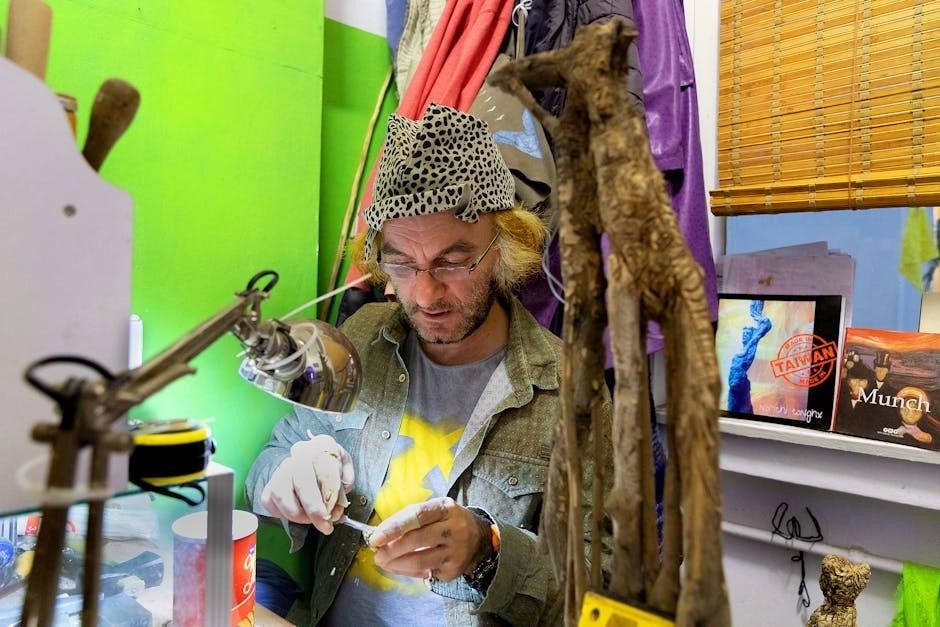
8.3 Resources for Further Assistance
For additional support with your Honeywell TH4210U2002 thermostat‚ several resources are available to ensure optimal use and troubleshooting. The official Honeywell website provides comprehensive installation manuals‚ user guides‚ and troubleshooting tips. You can also access the thermostatmanuals.com website‚ which offers downloadable PDF versions of the manual for easy reference. Additionally‚ Honeywell’s customer support team is available to address specific queries or concerns. For visual guidance‚ YouTube tutorials and installation videos can be helpful. Regularly check for software updates on the Honeywell Home app or website to keep your thermostat up-to-date. If issues persist‚ refer to the troubleshooting section in the manual or contact a certified HVAC technician for professional assistance. These resources ensure you can resolve any challenges and fully utilize your thermostat’s features.
